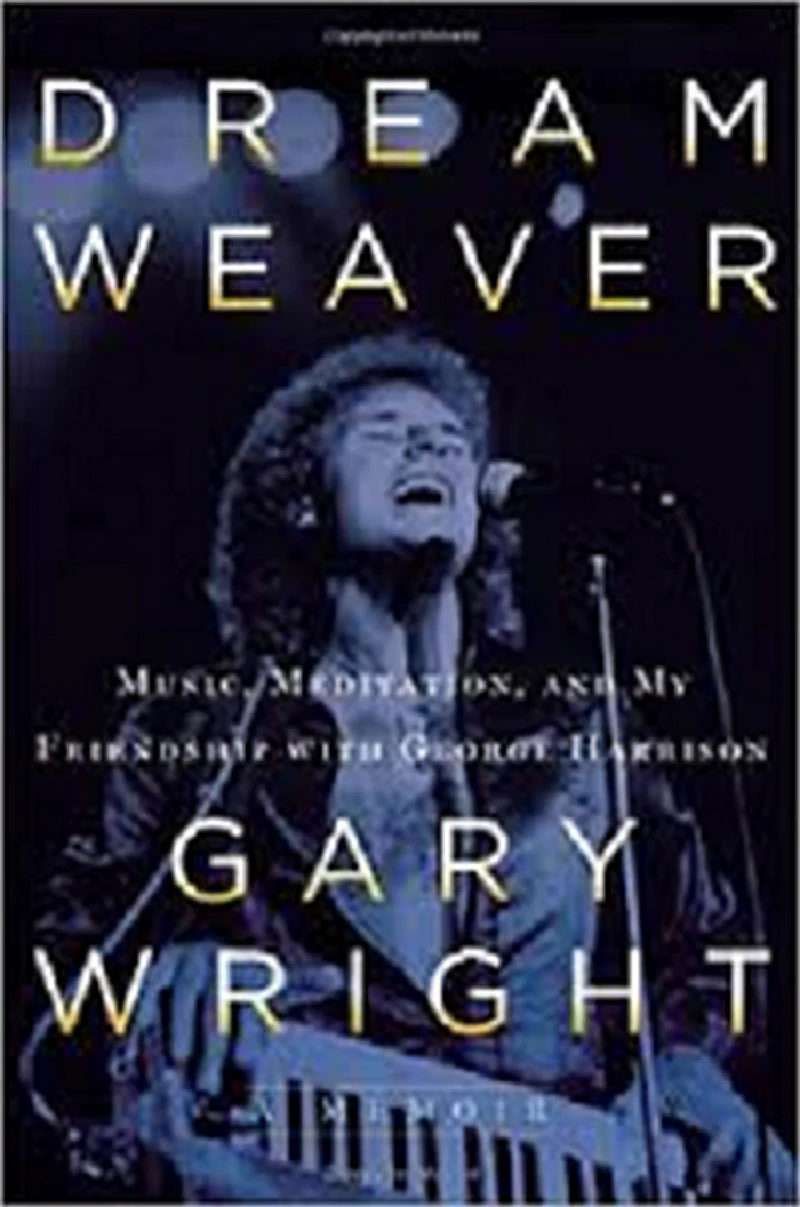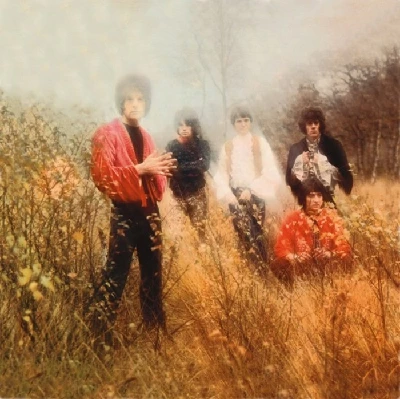Gary Wright - Dream Weaver: Music, Meditation, And My Friendship with George Harrison
by Lisa Torem
published: 13 / 11 / 2014

intro
In 'Raging Pages' Lisa Torem reflects on singer-songwriter Gary Wright's new autobiography which tells of his spiritual experiences and lengthy friendship with George Harrison
‘Dream Weaver: Music, Meditation and My Friendship with George Harrison’ was written by singer-songwriter Gary Wright. His 1975 hit single, ‘The Dream Weaver’, has become an American standard and was based on Wright’s philosophy that “God’s infinite mercy” carries us “through our trials.” The book starts with Wright’s recounting of a horrific accident--an event that foreshadowed his spiritual path. Why did he survive the crash? His Catholic background didn’t provide the answers he needed. He would study the teachings of Siddhartha in college, but this challenged his beliefs. Somewhat sceptical about the concept of Heaven and Hell, he knew he had to search for new meaning. His father, who worked in construction, allowed young Gary to drive a bulldozer. They would also go ice fishing, do household repairs and garden. Because they also owned animals, Gary learned to develop responsibility and deal with death. Wright states: “…the very nature of this world is duality; joy and sorrow, love and loss.” Despite the difficulty of learning those early lessons at a tender age, Gary looked back to discover that he was forming his own truths. His mother loved music and worked as a singer before settling down. She even sang a duet of ‘Night and Day’ with singer/waiter Frank Sinatra at the Rustic Cabin roadhouse in Englewood Cliffs, New Jersey. Gary would spend many hours memorising lyrics and sound effects of children’s’ recordings, often driving his family crazy on road trips. By the age of eleven, Gary had become an actor. Later as a high school senior, he started the Coachmen Five and then performed with sax player Billy Crandall, who had performed with Bob Gaudio, of the Royal Teens. They would hone their chops in their newly formed band the Twistabouts; having played Hammond organ, he recalled: “…as we played more and more, the band became really tight.” During his junior year at NYU, he worked as a tour guide. In 1966, he went to Berlin to study psychology and explored the idea of financing and forming bands, which would play gigs there in popular clubs. In between, he studied “the healing powers of the Hawaiian medicine men”; spirituality was once more beckoning. In 1967, he returned to Berlin with the New York Tymes. They would expand their reach and tour more European cities. Through Radio Caroline or Radio Luxembourg he heard George Harrison’s ‘Within You Without You.” He was mesmerized by the unique confluence of sitar, tamboura, and the tables but had no idea that someday this introspective composer would greatly influence his spiritual path. When the band was asked to open for Traffic on their ‘Mr. Fantasy’ tour in Oslo, Gary found himself transfixed by Steve Winwood and Dave Mason’s original tunes. Chris Blackwell, impressed by the exciting opening act, invited them to record in London. There’d be some bittersweet changes coming down the pipeline that would change Wright’s path once again. His formed a new band Spooky Tooth, and the wild sixties scene followed. Spooky Tooth performed covers like ‘Tobacco Road’ and Janis Ian’s ‘Society’s Child’, but Gary would also stretch his wings as songwriter. By the end of 1968, they had recorded ‘Spooky Two’ with Dave Mason, Joe Cocker and Steve Winwood adding their touches. Gary was on his way to form a solo career. He met George Harrison after being asked by Klaus Voormann to attend a session at Abbey Road Studios, London. “I felt in my heart that I was meeting an old friend that I hadn’t seen in year - or maybe lifetimes,” he recalled. George Harrison was wearing sandals and a white, flowing robe. Wright was “quickly disarmed by his simplicity and kindness.” George sang about Lord Krishna, something Gary had never heard stated in popular music. The ‘All Things Must Pass’ recordings contained so many themes and lyrics that intrigued Wright; ‘Art of Dying’, ‘Hear Me Lord’ etc. Soon he was asked to tea at Friar Park, George’s manor house. Perhaps touching memories of Gary’s own childhood came rushing back as he and George planted “bulbs, flowers, and shrubs while talking about India and God.” When George handed him ‘Autobiography of a Yogi’, Wright reflected back on his close relationship with his father. They shared vegetarian feasts and marvelled at photographs lining the walls that depicted gurus. In 1971, Wright produced solo album ‘Footprint’, and under a pseudonym, George offered his services as a backing singer and instrumentalist. They also travelled together to Portugal, Sweden and Switzerland. Gary played keyboards and enjoyed George’s ‘Living in the Material World’ album. But travelling with George on that first trip to India, where they would visit Ravi Shankar in Benaras, would be life-changing. Gary would record the ‘Light of Smiles’ album and return to India. His relationship with George would deepen but Gary would experience relationship strife and lulls in his career. More transitions would lie on the horizon. This is a unique story. Whilst many of us are aware of Gary Wright’s work as keyboard/organ player, arranger and songwriter and appreciate George Harrison’s incredible canon and legacy for incorporating Eastern music into rock recordings, few books have revealed how passionately George Harrison felt about his spiritual growth or how spirituality and music bonded these two together until George Harrison’s final days. Even if these central characters weren’t famous, this autobiography would still stand up as an exceptional story about building and sustaining a friendship and discovering one’s path despite overwhelming obstacles. There is enough here, too, to satisfy the fan who wants to name check the names and haunts of their idols throughout rock’s “golden period.” Well-written and digging way below the surface, ‘Dream Weaver’ will more than “get you through the night.”
Also In Raging Pages
Alice Cooper (2015)
Beatles (2022)
Benjamin Orr (2018)
Bernard Purdie (2015)
Billy Bragg (2017)
Billy J. Kramer (2016)
Bob Boilen (2016)
Bob Dylan (2018)
Bob Marley (2019)
Brian Wilson (2017)
Byrds (2024)
Carl Ewens (2025)
Cher (2025)
Clive Davis (2015)
Common (2020)
Damned (2021)
Don Short (2020)
Donovan (2022)
Elliott Murphy (2019)
Elvis Costello (2015)
Felix Cavaliere (2022)
Flip Side (2025)
Frank Sinatra (2023)
Frank Zappa (2017)
Gene Simmons (2015)
Geoff Emerick (2018)
George Harrison (2022)
George Martin (2019)
Green Day (2019)
Holger Czukay (2025)
Ian Mclagan (2016)
Iron Maiden (2014)
Jann Wenner (2019)
Jerry Lee Lewis (2015)
Jerry Nolan (2018)
Jim Summaria and Mark Plotnick (2019)
Jimmy Webb (2022)
Joe Perry (Aerosmith) (2014)
John Lennon (2017)
Kinks (2014)
Lani Hall Alpert (2019)
Laurence Juber (2014)
Liberty DeVitto (2021)
Lisa Robinson (2021)
Lita Ford (2021)
Little Anthony (2014)
Louise Harrison (2015)
Luke Haines (2024)
Manic Street Preachers (2017)
Mary Wilson (2021)
Michael Bloomfield (2020)
Michael Dorf (2019)
Miscellaneous (2014)
Ozzy Osbourne (2014)
Pamela Des Barres (2017)
Paul McCartney (2020)
Radiohead (2022)
Renee Rosen (2018)
Richard Balls (2018)
Rick Wakeman (2023)
Ringo Starr (2015)
Robby Krieger Band (2022)
Roger Daltrey (2020)
Rolling Stones (2016)
Ronnie Wood (2015)
Roy Bond (2023)
Sam Phillips (2018)
Sean Madigan Hoen (2014)
Silas House (2020)
Spencer Vignes (2017)
Spirit (2023)
Suzi Quatro (2023)
Sylvain Sylvain (2018)
Thin Lizzy (2016)
Tommy James (2021)
Tommy Mottola (2025)
Tori Amos (2020)
U2 (2021)
Who (2014)
Will Romano (2015)
Woody Woodmansey (2018)
Zz Top (2014)
most viewed articles
current edition
Carl Ewens - David Bowie 1964 to 1982 On Track: Every Album, Every SongArmory Show - Interview with Richard Jobson
Colin Blunstone - Thalia Hall, Chicago, 16/7/2025
John McKay - Interview
Visor Fest - Valencia, Spain, 26/9/2025...27/9/2025
Bathers - Photoscapes 1
Billie Eilish - O2 Arena, London, 10/7/2025
Loft - Interview
Robert Forster - Interview
Sir Tim Rice - Interview
previous editions
Heavenly - P.U.N.K. Girl EPManic Street Preachers - (Gig of a Lifetime) Millennium Stadium, Cardiff, December 1999
Beautiful South - Ten Songs That Made Me Love...
Oasis - Oasis, Earl's Court, London, 1995
Prolapse - Interview
Boomtown Rats - Ten Songs That Made Me Love....
Trudie Myerscough-Harris - Interview
Peter Perrett - In Dreams Begin Responsibilities Interview Part One
Coldplay - Wembley Arena. London, 16/8/2022
Pixies - Ten Songs That Made Me Love...
most viewed reviews
current edition
Davey Woodward - Mumbo in the JumboAmy Macdonald - Is This What You've Been Waiting For?
Sick Man of Europe - The Sick Man of Europe
Phew, Erika Kobayashi,, Dieter Moebius - Radium Girls
Lucy Spraggan - Other Sides of the Moon
Alice Cooper - The Revenge of Alice Cooper
Bush - I Beat Loneliness
Suzanne Vega - Flying With Angels
Blueboy - 2
Cynthia Erivo - I Forgive You
related articles |
|
Spooky Tooth: Profile (2015 |

|
| With a new nine CD box set retrospective 'The Island Years' that comprises their entire history from 1967 to 1974, Keith How examines the career of prog rock act, Spooky Tooth |
Pennyblackmusic Regular Contributors
Adrian Janes
Amanda J. Window
Andrew Twambley
Anthony Dhanendran
Benjamin Howarth
Cila Warncke
Daniel Cressey
Darren Aston
Dastardly
Dave Goodwin
Denzil Watson
Dominic B. Simpson
Eoghan Lyng
Fiona Hutchings
Harry Sherriff
Helen Tipping
Jamie Rowland
John Clarkson
Julie Cruickshank
Kimberly Bright
Lisa Torem
Maarten Schiethart